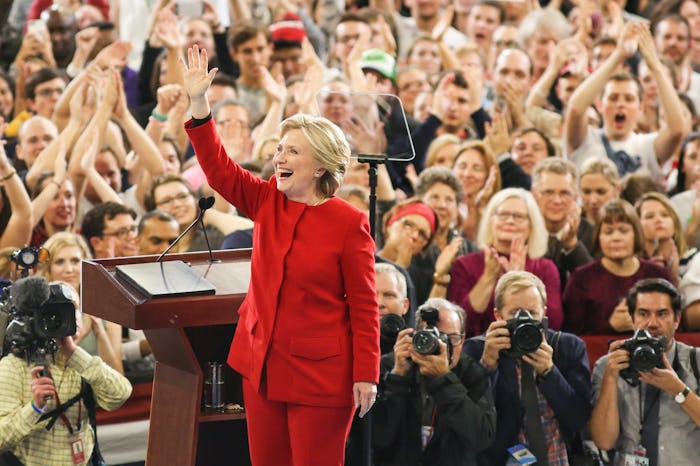
Hillary Clinton Wins Popular Vote & Some Say That's Evidence Against The Electoral College
In news that shocked half of the nation in the wee hours of Wednesday morning, the United States elected Republican presidential nominee Donald Trump as the president-elect, inching former Secretary of State Hillary Clinton out of the presidency by mere hundreds of thousands of votes. As the numbers poured in from polling stations across the country, it was clear the race would come down to the final votes. But even though Trump won the White House, Clinton won the popular vote. In light of the news that Clinton won the popular vote, many want to do away with the Electoral College all together. This morning, after a full seven hours to digest the news, it seems like many in America are totally shellshocked: How could a candidate win the popular vote but lose the election?
According to NPR, Clinton had a running total of 59,204,408 votes as of Wednesday morning around 9 a.m. ET, compared to Trump's 59,058,307. By that total, NPR notes, 146,101 votes separate Clinton and Trump, making her the fifth presidential candidate to win the popular vote and lose the election. More than that, it would mark the second time in the last two decades where a Democrat has lost a national election by electoral votes, but won according to the popular vote. So, I'll ask what many have been scratching their heads over all morning: Why do we even have the Electoral College? What does it do? And shouldn't we get rid of it, especially if the popular vote is in direct contrast of its totals?
According to Mic, the Electoral College is a group of people selected by each state to vote for the president. More often than not, that selection usually lines up with the candidate who won the popular vote. But history has shown (both in the past and right now) that this isn't always the case. And people are rightly confused. When you vote for president, as Mic points out, you're casting your vote in the tank for the popular vote. Here's where things get tricky: When you vote for your candidate, you're also voting for your selected electoral voter. Though Electoral College votes are typically expected to stay faithful to their party, electoral voters are not obligated to do so. In an editorial published on Vox, author Andrew Prokop sums up people's feelings on the Electoral College quite matter-of-factly:
It’s a patchwork Frankenstein’s monster of a system, which in the best of times merely ensures millions of Americans’ votes are irrelevant to the outcome because they don’t live in competitive states, and in the worst of times could be vulnerable to a major crisis.
In 2000, Vox pointed out, Al Gore won half a million more votes than George W. Bush to secure him the popular vote. However, Bush ultimately won the presidency thanks to a recount in Florida that put him ahead by just 537 votes. According to Vox, 4 percent of the country's popular in the smallest states in our union will end up being endowed with 8 percent of Electoral College votes. And when you're playing a game of numbers, 8 percent shakes out to be a huge factor.
Over the years, Gallup polls have shown time and time again that American voters want to do away with the Electoral College (more than six in 10 people want to abolish the Electoral College, a shocking 63 percent of Americans).
And Vox notes that in order to do away with the Electoral College all together, Americans would have to pass a constitutional amendment (highly unlikely right now given that Republicans control the House and the Senate as well as the presidency) that would need to be called for by 34 states. Another alternative is to enact the National Popular Vote Interstate Compact, which would mean that states would agree to pledge all its electors not to its state winner but to the national popular vote, but only if states "controlling 270 or more electoral votes have agreed to the do the same."
By that logic, last night would've played out incredibly differently. Maybe it's time we consider the possibilities.